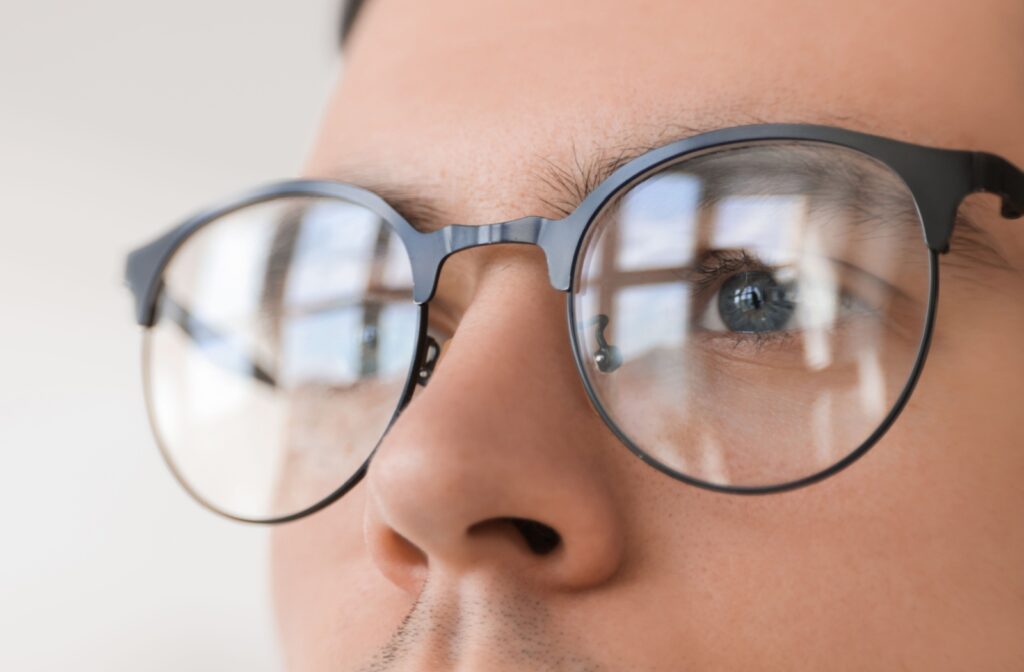Table of Contents

Introduction
You may be reading this because, like millions of people worldwide, you have myopia or nearsightedness. You might also be wondering if your myopia will improve as you get older.
Unfortunately, though vision does change naturally as we age, myopia doesn’t usually get better on its own. While it’s possible to manage myopia in children and slow progression of the condition, myopia can’t actually be reversed.
What Is Myopia?
Myopia is a common vision issue that makes faraway objects seem blurry while objects seen up close remain clear. Myopia usually occurs when the eye grows too elongated, causing light to focus in front of the retina—the tissue responsible for sending light signals to your brain—rather than directly onto it.
While the exact cause of myopia isn’t completely understood, both genetic and environmental factors contribute. Environmentally, doing too much close-up work and spending limited time outdoors are both believed to play a role.
Myopia is typically diagnosed through a comprehensive eye exam and can be managed with various correction methods, including:
- Glasses
- Contact lenses
- Specialized eye drops
Does Myopia Stabilize or Improve as You Get Older?
For some people, myopia may stabilize as they reach adulthood. As we become adults, growth of the eye tends to slow down, leading to fewer visual changes. But stabilization doesn’t mean improvement
In certain cases, myopia may continue to progress slowly even in adulthood, albeit at a pace compared to childhood and adolescence.
It’s important to have regular eye check-ups to monitor any changes in your vision due to myopia and to adjust your prescription as needed.
How Lifestyle Affects Myopia Progression
Lifestyle factors also play a role in myopia progression.
Screen Time & Myopia
Studies suggest that prolonged screen exposure can strain the eyes, which might aggravate myopia over time.
Taking regular breaks, practicing the 20-20-20 rule (looking at something 20 feet away for 20 seconds every 20 minutes), and ensuring proper screen positioning can help mitigate these effects.
Time Outdoors & Myopia
Spending time outdoors has been shown to slow the progression of myopia. Natural light exposure and engaging in activities that require looking at distant objects can both help maintain healthier vision.

Managing Myopia
While myopia can’t be reversed, and while it doesn’t get better with age, it’s possible to slow the progression of myopia in children. Proper myopia management means that children will grow up with relatively better vision and may be able to avoid developing high myopia, a condition linked to eye issues later in life.
Here are some common options for managing myopia:
Abiliti Lenses
Atropine Eye Drops
Atropine eye drops have shown promise in managing myopia in young people. Recent studies indicate that these drops can slow elongation of the eye.
MiSight Contact Lenses
MiSight contact lenses are used to slow myopia progression in children and teens. These lenses feature a unique design that alters how light is focused on the retina, thereby mitigating unwanted growth of the eyeball.
By creating a special defocus treatment zone, MiSight lenses discourage the eye from growing in a way that makes myopia worse.
Orthokeratology (Ortho-K) Lenses
For adults, orthokeratology lenses offer a non-surgical option for vision correction that is both effective and convenient. These contact lenses are worn overnight, gently reshaping the cornea while you sleep. The effects are temporary, but it still means that you don’t have to wear contacts during the day.
Ortho-k lenses have been shown to slow myopia progression.
Outside of myopia management, orthokeratology lenses can be particularly beneficial for those with active lifestyles or those who prefer a hassle-free way to correct their vision.
BT50 Glasses
BT50 glasses are another option for adults looking to manage myopia. These glasses focus on providing comfort and clarity, while also addressing any lifestyle factors that might contribute to myopia progression.
Consulting Your Eye Doctor for Myopia Care
Regular consultations with an eye doctor are important for managing myopia effectively. Your optometrist can provide personalized guidance based on your unique vision needs and lifestyle. They can also monitor any changes in your vision and recommend appropriate corrective measures.
If you’re concerned about myopia progression or experiencing changes in your vision, book an appointment with Golden Vision. We can provide you with the support and expertise you need. Our team of professionals is dedicated to helping you achieve optimal eye health.

